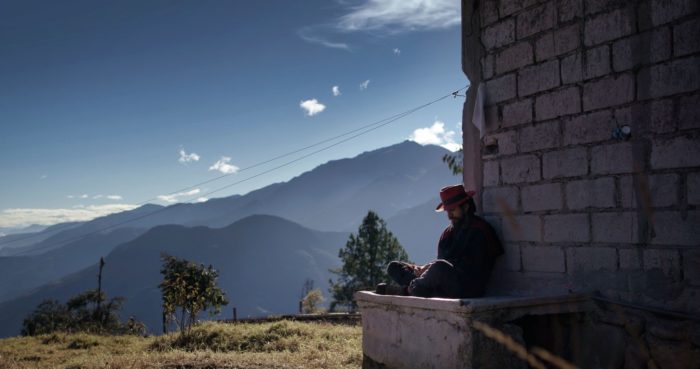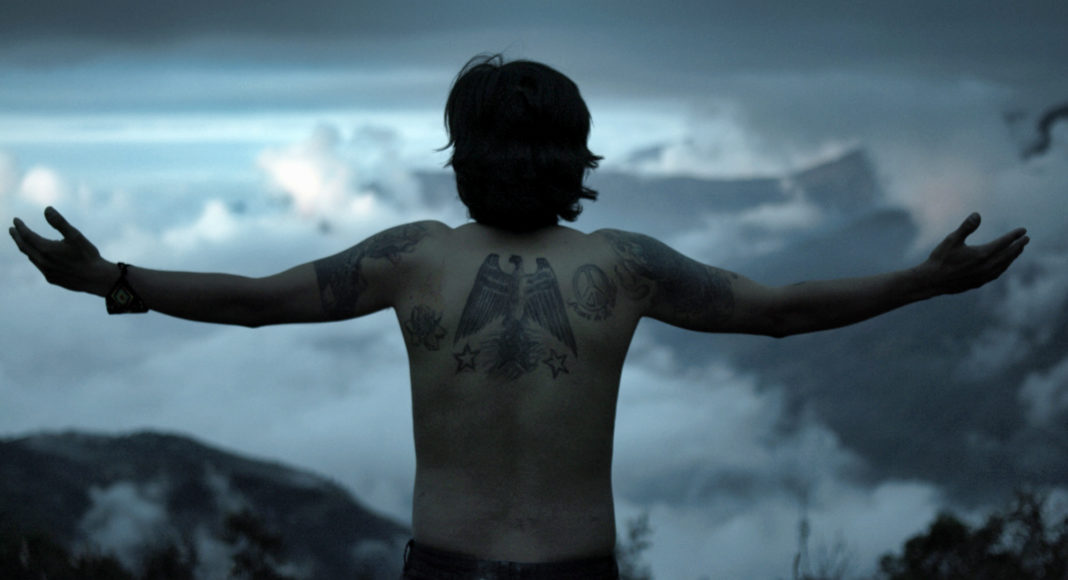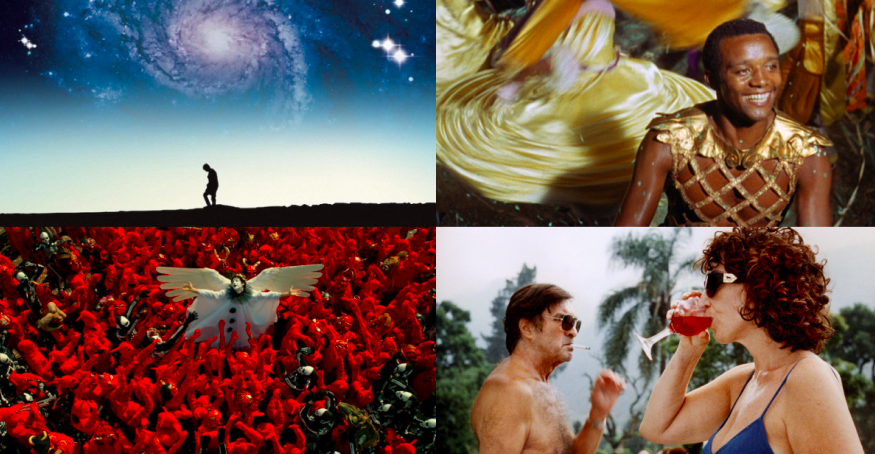This Stolen Country of Mine is a gripping documentary following resistance leader Paúl Jarrín and investigative journalist Fernando Villavicencio, as they fight to stop the plunder of Ecuador’s natural resources through mining. Directed by German filmmaker Marc Wiese, the shocking film documents what has been called a re-colonization of Ecuador by China, amidst rampant government corruption, and citizens’ fight to take back their land. The soundtrack, composed by Alva Noto (The Revenant), accentuates their heart-wrenching struggles.
‘The mine destroys our way of life, our worldview, the way we live, the way we relate to the land, to life, to water, to income, to our livelihoods.’
The film opens with a mystical scene of two men praying to Pachamama, surrounded by clouds in a mountainous landscape. One is Paúl Jarrín, who we soon witness in a nerve-wracking car ride as he warns his friends, who are blocking the road to Chinese-run Río Blanco mine in Molleturo, of an imminent police attack. Dramatic scenes follow, as rocks are thrown at the police, who answer with tear gas and take Jarrín. The emotion of these people, who have had their land invaded and their water contaminated, is clear. With a distant look, fellow resistance leader Hernán Galazar confirms he is willing to use arms to defend the land.
Neo-colonialism
Rafael Correa became President of Ecuador in 2007, towards the end of the ‘pink tide’ of Latin American democracies moving to the left and away from the neoliberal model. When Western governments refused to fund his leftist regime, Correa turned to China for credit.
This riveting documentary exposes the corruption in Correa’s government and the filmmakers gain access to damning evidence. Scenes of Ecuador’s busy capital City, Quito, contrast with the lushness of Jarrín’s mountains and frame our second protagonist Fernando Villavicencio’s fight. Villavicencio here uncovers, from leaked government documents, that Ecuador received huge sums of money from China and Thailand. To release the credit, the government signed thousands of contracts for Chinese companies to provide infrastructure services, as well as oil and mining projects. In a dramatic turn of events, it becomes clear these discoveries have put Villavicencio’s life in danger. Soldiers raid his home and he is forced to flee.
China has been heavily criticized for giving credit lines to developing nations in Latin America and Africa in exchange for primary resources and economic control through unfair, long-term contracts with Chinese companies. It has been called ‘re-colonization’ or ‘neo-colonialism’, given the resemblance to relations between European colonial powers and African nations in the 19th and 20th centuries.
An anonymous government official who was part of the review commissioned by the next President, Lenin Moreno, recounted how, upon uncovering the contracts, officials met with Chinese companies. They tried to renegotiate the brutally unfair terms that would see Ecuador repaying 10 times the value of the loan in oil barrels, but China refused. Villavicencio declares, ‘they control the political power. We have been colonized. Again’.

The fight for land and life
In the words of Jarrín’s mother, ‘he wants to save the world’. In ‘This Stolen Country of Mine’, we see how much he has sacrificed to defend his community, amidst threats to his life: he talks matter-of-factly about his death. The film skilfully documents what has become a pattern in many Latin American countries: social protest is criminalized; the government backs Chinese companies against its own people, sending soldiers to what would have been peaceful protests.
Tense footage captured on hand-held cameras gives the film a sense of immediacy and offers valuable insight. This is not just a battle over land, it is a fight for life: for the livelihoods of these people and their children. In a sombre and chilling meeting of guerrillas in balaclavas from Azuay, before they attack the Chinese-owned Rio Blanco mining camp, the men say they are prepared to do whatever it takes, whether this means death or imprisonment. Dramatic footage of the attack shows how serious they are.
The government has called these groups thieves and accused them of committing terrorist acts. Carlos Andrés Vera, the documentary’s Producer, spoke of the group via Twitter: ‘I do not consider them terrorists. I don’t share their mechanisms, but I understand their actions. They do not seek power or commit terrorist acts, but they have resisted the imposition of a project on their land.’
The touching mountain scenes and Jarrín’s deep reverence for nature remind us of our interdependence with the earth. Whilst these fights in small Indigenous villages may seem far away to Western viewers, the film is an important reminder of the devastation that can be caused by globalization and the exploitation of natural resources.
This is a documentary that will stay with you. Villavicencio’s work paid off as his investigation informed Correa’s prosecution. However, in Ecuador and all-over Latin America, many other communities are still suffering from the effects of mining. The current Ecuadorian President, centre-right Guillermo Lasso, is in favour of mining replacing oil as Ecuador’s main source of income. As Jarrín puts it, ‘The resistance continues’.
‘This Stolen Country of Mine’ is showing at Bertha DocHouse (Curzon Bloomsbury) in London from 15-26 January 2023.


